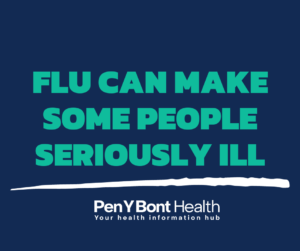
Receiving a flu vaccination is safe and effective. Pen-Y-Bont Health offers a free vaccination every year to help protect people at risk of getting seriously ill from flu.
Flu vaccine and COVID-19 seasonal booster
If you are eligible for the flu vaccine, you may also be eligible for the coronavirus (COVID-19) seasonal booster.
Getting both the vaccines is important because:
- it’s likely more people will get flu this winter
- people are likely to get seriously ill if they get flu and COVID-19 at the same time
It is safe to have both vaccines at the same time, but you need to attend the appointments separately:
- Please book your flu vaccine with your GP surgery
- Please wait for a letter invitation from the health board for your COVID-19 seasonal booster
For more information on the seasonal booster, click here.
Why is the flu vaccination important?
Receiving a flu vaccination is important because, while flu can be unpleasant for most people, it can also be dangerous and even life threatening for some people, especially for those with certain health conditions.
We recommend having your flu vaccine in the autumn or early winter before flu begins spreading. But you can get a vaccine later.
Who is eligible to have the flu vaccine?
The flu vaccine is given to adults in at-risk groups including:
- Those aged 65 and over (including those who will be 65 by 31/3/2023)
- Those with certain health conditions
- Those who are pregnant
- Those in long-stay residential care
- Those receiving a carer’s allowance, or that are the main carer for an older or disabled person who may be at risk if you get sick
- Those who live with someone who is more likely to get a severe infection due to a weakened immune system, (such as someone living with HIV, someone who has had a transplant, or is having certain treatments for cancer, lupus or rheumatoid arthritis)
From mid-October, people aged 50 years old or over (including those who will be 50 years old by 31/3/2023) can have the flu vaccine. This is so at-risk groups can be offered vaccination first. However, if you’re in this age group and have a long-term health condition (that puts you at risk from flu), you do not have to wait until mid-October.
Where to get the flu vaccine in Bridgend
The flu vaccine is available at all 5 of our GP surgeries. Please call your surgery to book your vaccine. Contact details for our surgeries can be found here.
If you have a flu vaccine at any NHS service that is not your GP surgery, you do not have to tell your GP surgery. Records will be updated for you. If you’ve been given a flu vaccine privately, or through an occupational health scheme however, and you would like it added to your NHS record, you can ask your GP surgery.
It’s important to attend your vaccination appointment, unless you have symptoms of COVID-19.
Everyone who is eligible for the free flu vaccine will be able to get it.
Our GP surgeries get the flu vaccine in batches throughout the flu season. If you cannot get an appointment straight away, ask if you can book one for when more vaccines are available.
Flu vaccine for patients with long-term health conditions
The flu vaccine is offered to any of patients with a serious long-term health condition, including:
- chronic kidney disease
- liver disease, such as hepatitis
- some neurological conditions, such as Parkinson’s disease, motor neurone disease, multiple sclerosis (MS), or cerebral palsy
- respiratory conditions, such as asthma (needing a steroid inhaler or tablets), chronic obstructive pulmonary disease (COPD), including emphysema and bronchitis
- diabetes
- heart conditions, such as coronary heart disease or heart failure
- being very overweight – a body mass index (BMI) of 40 or above
- a learning disability
- problems with your spleen like sickle cell disease, or if you’ve had your spleen removed
- a weakened immune system as a result of conditions such as HIV and AIDS, or taking medicines such as steroid tablets or chemotherapy
If you have a long-term condition that is not in one of these groups, talk to your GP. If your GP thinks you’re at risk of serious problems by getting the flu, you will be offered a vaccine.
How effective are flu vaccinations?
Vaccinations give the best protection against flu.
A flu vaccine can help protect against the main types of flu viruses, although there’s still a possibility that you might get the flu.
If you do get the flu after a vaccination, it’s likely to be milder and not last as long.
Having a flu vaccine may also help you stop spreading flu to other people who could be more at risk of serious problems from flu.
It could take 10-14 days for the flu vaccine to work.
